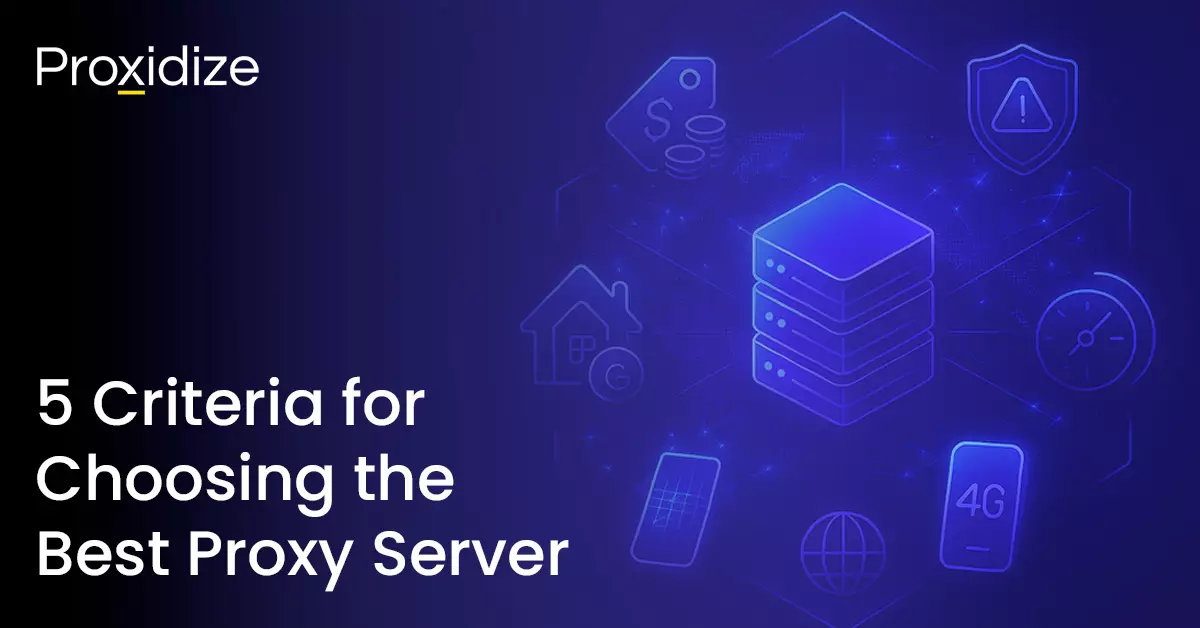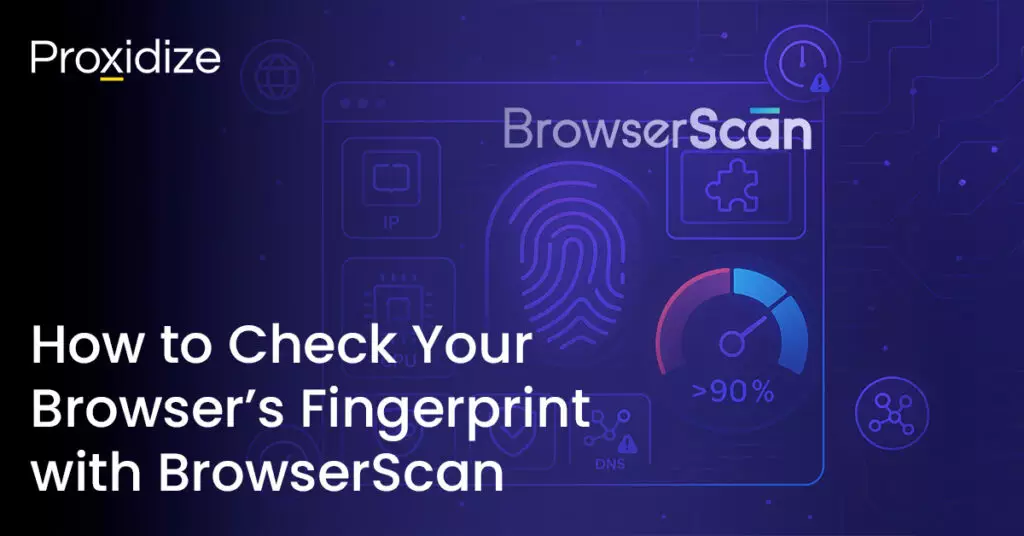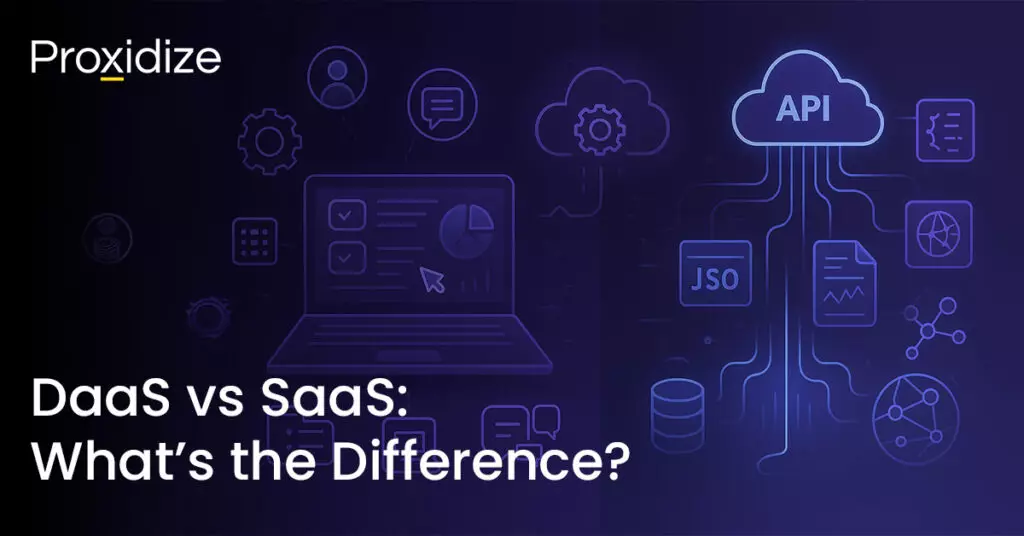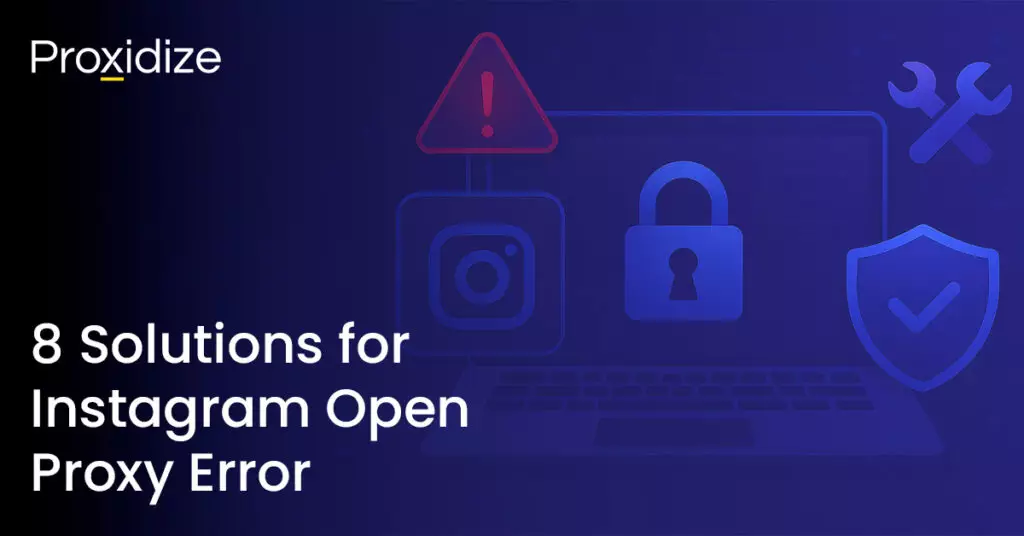Proxy servers — whether used for web scraping, online security, managing multiple social media accounts, or bypassing geo-restricted content — come in a variety of forms. The three primary types of proxies that dominate the market are datacenter proxies, residential proxies, and mobile proxies. Each of these sources its IP addresses differently, which in turn influences pricing, detection risk, speeds, location targeting, and how “authentic” the IP appears.
In this article, we’ll compare these three proxy types across five categories to determine which is the best proxy server for you:
- Budget and Price
- Risk of Detection
- Speed and Scalability
- Location Targeting & Geographical Coverage
- IP Authenticity
Our goal is to provide an educational, technical, and comprehensive overview so you can select the type of proxy server that best suits your online activities.
Budget and Price
Datacenter Proxies: Typically the Cheapest Option
Datacenter proxies derive their IP addresses from cloud hosting platforms or data centers. Because data centers can acquire large IP blocks at once, the cost to maintain these IPs is relatively low. Many proxy server providers offer datacenter proxies for a flat monthly fee or a usage-based pricing model that is cheaper than the alternatives.
- Why They’re Budget-Friendly
- Bulk IP Allocation: Data centers can purchase large swaths of IP addresses in one go.
- Less Overhead: Compared to hooking into real household connections or mobile networks, data center infrastructure is more straightforward, reducing operational costs.
- Scalable Plans: Many proxy providers sell proxy lists of datacenter IPs at discounted bulk rates. For high-volume scraping or testing, dedicated datacenter proxies can be especially cost-effective.
- Typical Cost Structures
- Monthly Subscription: Datacenter IPs are often sold in monthly bundles, such as 10 or 50 IPs at a time.
- Pay-As-You-Go: Some services charge a fixed rate per IP per month, often with unlimited bandwidth or a very high traffic allowance.
If your primary concern is minimizing proxy service cost while still benefiting from moderate or high speeds, datacenter proxies are often the cheapest option.
Residential Proxies: Mid-Range Pricing
Residential proxies route traffic through IP addresses assigned to home-based private networks by an internet service provider (ISP). Because these IPs come from genuine household connections, they are costlier for proxy service providers to obtain and maintain.
- Why They Cost More Than Datacenter
- Limited Access: Gaining access to a large pool of ethically sourced residential IPs is more complex than simply renting data center servers.
- Per-GB Billing: Many residential proxy providers charge per gigabyte of bandwidth. This usage-based model often ends up being more expensive if you have large-scale scraping or data extraction needs.
- Typical Cost Structures
- Pay-Per-GB: Ranges from $5 to $15 (or more) per GB, depending on the proxy provider and location.
- Monthly Plans: Some providers do offer monthly or pay-as-you-go pricing plans, though bandwidth is typically capped.
Residential proxies strike a balance between authenticity and cost. They aren’t as cheap as datacenter IPs, but if your project requires better trust signals at a moderate price point, residential IPs are often worth the added expense.
Mobile Proxies: Often the Most Expensive
Mobile proxies obtain IP addresses from mobile devices connected to 3G, 4G/LTE, or 5G cellular networks. To operate, these proxies often rely on SIM cards and data plans — resources that can be significantly pricier than data center bandwidth or home broadband.
- Why They Cost the Most
- Cellular Data Fees: Cellular data is notably more expensive than home internet or data center bandwidth, especially at scale.
- Infrastructure Complexity: Building or leasing a mobile proxy network requires modems or other specialized hardware to handle frequent IP rotations and signal strength variability, but making your own mobile proxies is straightforward.
- High Demand, Low Supply: Because mobile IPs are highly trusted, there is strong demand. With limited availability, this pushes prices up.
- Typical Cost Structures
- Per-GB Pricing: $8 to $15 (or more) per GB is common, though some premium proxies cost even higher.
- Monthly/Weekly: Many providers offer “unlimited data” plans, but these can run to hundreds or even thousands of dollars per month because “unlimited” can be subject to fair-use policies.
If budget is a strict concern, mobile proxies may be out of reach for individual users needing large bandwidth. However, they provide unmatched authenticity and are crucial in certain online activities (like social media management) where detection is highly likely.
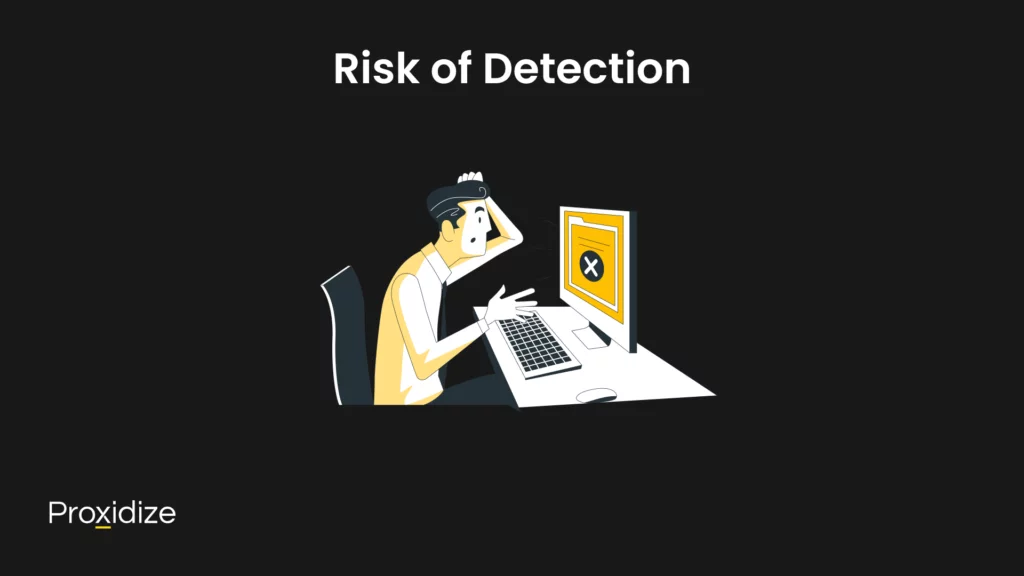
Risk of Detection
Datacenter Proxies: Highest Detection Rate
Because datacenter IP blocks are publicly known to originate from data centers, websites can quickly spot them through IP reputation databases, reverse proxy checks, or proxy checker tools. Thus, datacenter proxies face:
- Frequent CAPTCHAs & Blocks: E-commerce, ticketing, and social media platforms often see datacenter connections as suspicious.
- Stricter Rate Limits: High-volume tasks from known commercial ranges are more likely to trigger automated anti-bot systems.
Datacenter proxies work best on sites with lenient anti-bot policies or for tasks requiring sheer volume and speed without heavy content restrictions.
Residential Proxies: Medium Detection Risk
Residential proxies source real IP addresses from ISP-based home connections. This means:
- Lower Suspicion: Websites are more forgiving toward IPs that appear to be everyday home users.
- Occasional Blacklisting: Since many residential proxy services rotate IPs among users, some addresses can get flagged if the previous user triggered bans.
Overall, residential proxies encounter fewer blocks than datacenter IPs, making them suitable for moderate-security websites or higher-stakes operations like e-commerce market intelligence.
Mobile Proxies: Lowest Detection Rate
Mobile proxies are often turned to for their reduced IP blocks and minimal detection risk because:
- Cell Tower IPs: Mobile networks bundle many real consumers under a single public IP address (via CGNAT). Blocking that IP can inadvertently block legitimate smartphone users, so websites hesitate.
- Frequent Rotation: Mobile IPs change constantly as devices move or reconnect. A website can rarely pinpoint a single user for banning.
Sites with the strictest anti-bot measures — like advanced ticketing systems, specialized retail sites, or certain social media platforms — are least likely to penalize a genuine-looking IP from a mobile network.
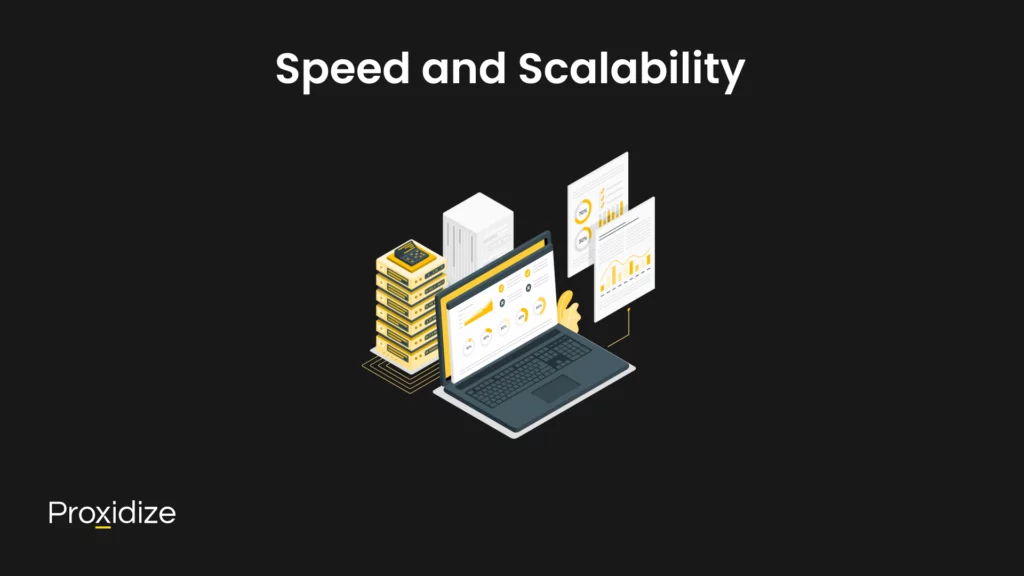
Speed and Scalability
Datacenter Proxies: Fastest & Most Scalable
Datacenter proxies excel when it comes to:
- High-Speed Infrastructure: Enterprise-grade data centers often boast faster speeds and lower latency.
- Massive Bandwidth: If your web scraping or testing operation requires tens or hundreds of gigabytes daily, datacenter proxies are set up for bulk traffic.
- Easy Scaling: Many data center providers can quickly allocate extra IPs if your project expands.
This is why they remain popular with SEO proxies or those running large-scale automation where speed and concurrency matter more than authenticity.
Residential Proxies: Good Speed, Limited at Scale
While generally slower than datacenter IPs, residential proxies can still maintain decent speeds. They might feature:
- Consistent Connection: A stable home broadband line can still deliver respectable throughput.
- Less Bandwidth: Because many providers price these proxies per GB, you have to carefully manage usage.
- Moderate Scaling: Acquiring thousands of residential IPs can become expensive and complex, but it remains feasible if your budget permits.
For moderately large projects — like frequent price scraping — residential proxies may strike an acceptable balance between speed and authenticity, albeit at a higher cost than data center proxies.
Mobile Proxies: Variable Speed, Moderate Scale
Mobile proxies use 4G LTE or 5G. The best-case scenario (5G with strong coverage) can offer:
- High Speeds: Comparable or even exceeding home broadband under optimal conditions.
- Unpredictable Performance: If signal strength is low or towers are congested, speeds can dip, and latency may spike.
- Scalability: After an initial investment, each additional SIM card or mobile device can be pricey. Large-scale usage often becomes cost-prohibitive.
Mobile proxies shine for high-risk tasks where you need the maximum chance of passing as a real user. For massive concurrent scraping, the cost and variability can be limiting.
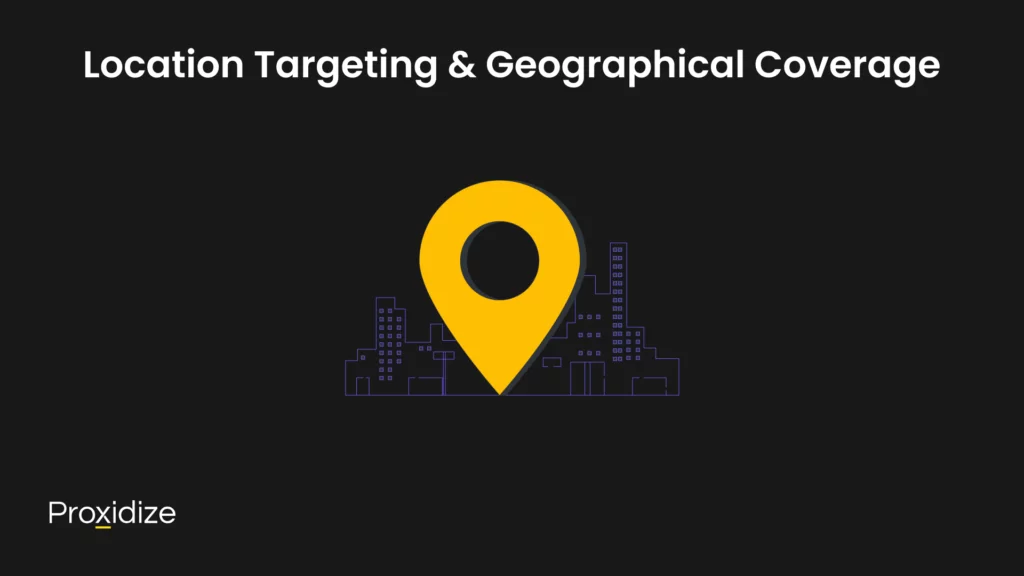
Location Targeting & Geographical Coverage
Datacenter Proxies: Widely Available, But Less Granular
Many datacenter proxy providers offer IPs in numerous countries and major cities:
- Global Footprint: Data centers exist worldwide, giving you broad coverage.
- Less Local Precision: You can select a city or region, but typically you won’t have a wide selection of cities.
For tasks that only require country-level coverage datacenter proxies suffice. If you need city-level or neighborhood-level accuracy, you may fall short.
Residential Proxies: Highly Granular Targeting
Because residential proxies come from real home connections:
- City-Level or ZIP Code-Level Targeting: Some proxy network providers let you filter proxies down to individual cities.
- Wide Availability: Households exist virtually everywhere, so you can handle localized tasks like hyper-local SEO or region-specific e-commerce data collection.
In industries where location plays a key role, residential proxies offer the most precision outside of mobile infrastructure.
Mobile Proxies: Regional to Country-Level
Mobile proxies depend on mobile carriers’ distribution of IP addresses. You can typically target:
- Country or Carrier: Depending on the mobile carrier, providers commonly advertise with things like “Germany 4G LTE proxies” or “USA 5G proxies,” for instance, allowing specific locations worldwide.
- Less City-Level Granularity: While some providers do offer city-specific mobile proxies, they’re not as widespread as residential IP pinpointing.
For tasks requiring “mobile-user” vantage points, this is ideal. However, if you need specific cities or neighborhoods, your options may be limited.
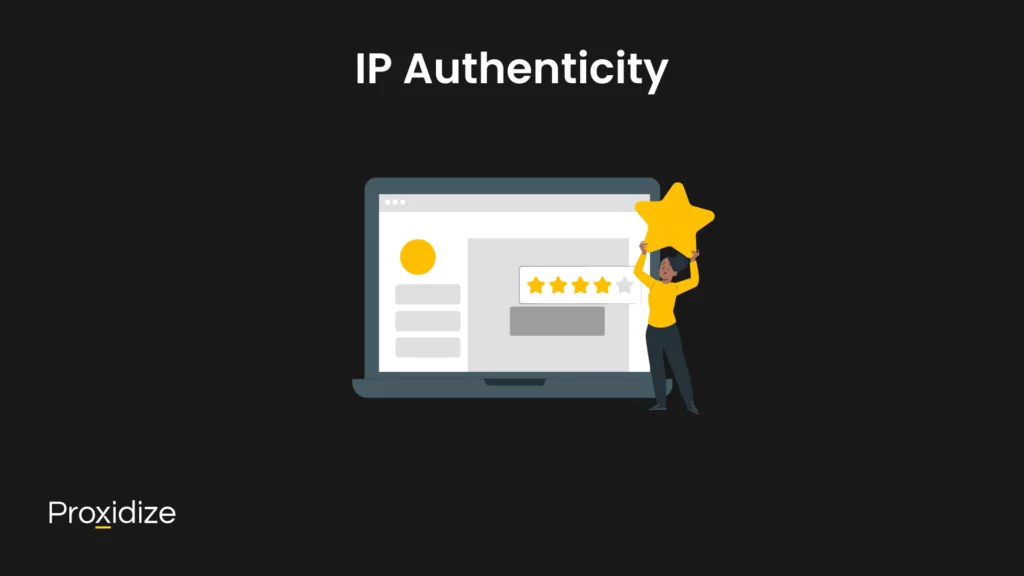
IP Authenticity
Datacenter Proxies: Lowest Authenticity
Datacenter proxies are typically the easiest to detect as they are registered to hosting companies, not ISPs or mobile carriers. When websites look up incoming IPs, those assigned to commercial data centers. Given that most legitimate users do not use datacenter IPs, those connections are treated with greater suspicion or assumed to be automated traffic.
Datacenter proxies are ideal for bulk data extraction and automation tasks on targets less suspicious of non-residential IPs.
Residential Proxies: Medium-High Authenticity
Because residential IPs belong to genuine households, they inherently appear more organic to websites.
- Real IP Addresses: The user effectively blends in with standard home-user traffic.
- Occasional “Shared IP” Issues: If a particular IP address was flagged in the past, you might inherit that negative reputation. Still, overall trust is far higher than with datacenter IPs.
Mobile Proxies: Highest Authenticity
Mobile proxies source IPs from cellular carriers — these are the hardest for websites to block broadly without risking legitimate mobile-user traffic.
- Frequent Rotations: Helps each IP appear fresh.
- CGNAT: Many users share a single IP, making it difficult for a site to single out one suspect user.
For tasks that demand minimal detection risk and the most genuine user profile — like high-value social media automation — mobile proxies are unmatched in IP authenticity.
Summary of Key Distinctions
Below is a concise overview comparing datacenter proxies, residential proxies, and mobile proxies across the five categories discussed:
- Budget and Price
- Datacenter: Inexpensive, well-suited to large-scale usage.
- Residential: Moderate cost, often charged per GB of bandwidth.
- Mobile: Highest cost due to cellular data fees and infrastructure.
- Risk of Detection
- Datacenter: Easiest to detect and block.
- Residential: Medium likelihood of detection, but much lower than datacenter.
- Mobile: Safest against blocks; websites hesitate to ban mobile IPs.
- Speed and Scalability
- Datacenter: Typically high-speed proxies with near unlimited connections; easy to add more IPs.
- Residential: Good performance, but can be throttled by usage-based billing; scaling is more expensive.
- Mobile: Potentially fast (4G/5G), but can fluctuate with coverage. Scaling can be cost-prohibitive.
- Geotargeting
- Datacenter: Broad country-level coverage, less city-level detail.
- Residential: Most granular location targeting possible.
- Mobile: Generally country or carrier-level targeting; city-level possible but less common.
- IP Authenticity
- Datacenter: Lowest authenticity, widely known as commercial IP space.
- Residential: High authenticity, recognized as home-user IPs.
- Mobile: The highest authenticity, extremely difficult for websites to block confidently.
Which Proxy Type is Best for You?
The best choice depends on your use case, budget, and risk tolerance:
- Datacenter Proxies
- Best for: High-volume web scraping and automation; any scenario where speed and cost-efficiency are key, and the site has moderate anti-proxy measures.
- Not ideal for: Websites with strict detection systems or tasks requiring maximum trust and stealth.
- Residential Proxies
- Best for: E-commerce data extraction, social media automation, and tasks where you need to appear as a genuine home user.
- Not ideal for: Extremely large-scale scraping if you’re on a tight budget, as per-GB costs can become steep.
- Mobile Proxies
- Best for: Ultra-high stealth on sites with rigorous anti-bot/fraud systems, specialized tasks, advanced social media management, or anything that absolutely can’t get blocked.
- Not ideal for: Massive data scraping or continuous tasks requiring terabytes of bandwidth, as the cost would be prohibitive.
In many professional projects, operators mix multiple proxy types. For example, you might run the majority of your data requests through datacenter IPs due to lower costs, then switch to residential or mobile proxies for trickier websites. This hybrid approach can optimize both budget and success rates.
